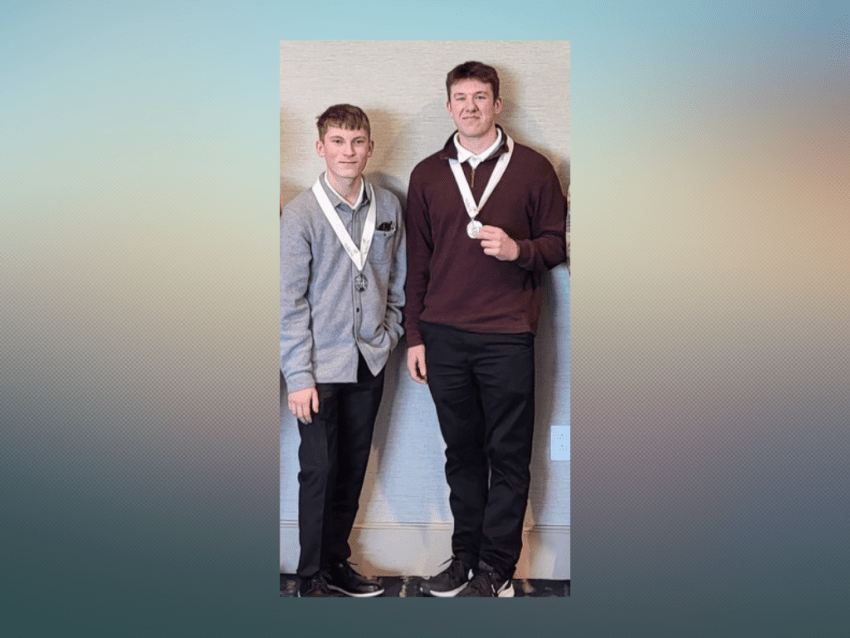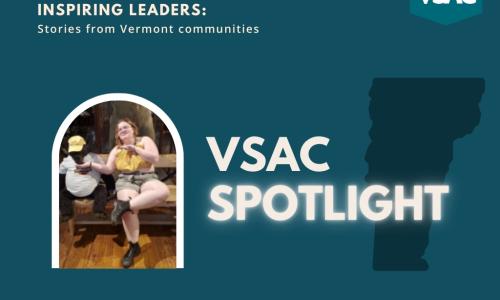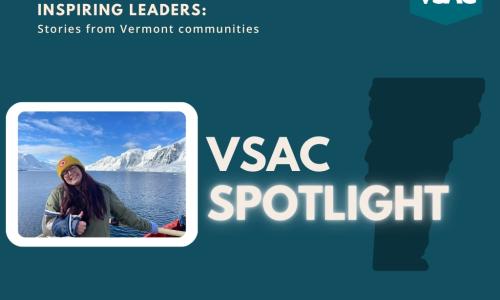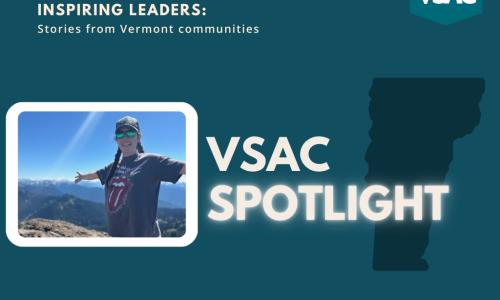Planning for college or training this year? Apply for the Vermont Grant.
Two classmates from North Country High School look to engineer their future

Cooper Hodgeman and Tate Parker have been challenging each other since elementary school, particularly when it comes to building things.
“My earliest memory of Tate was the fourth-grade garden trellis building contest. I was so mad when his group beat mine for first place,” says Cooper, who lives in Derby.
While the two friends were separated for a while shortly after Tate’s trellis team took home the win—when Tate’s family moved to Newport—they met up again in junior high and ended up in a lot of classes together. “We have similar interests, we’re both good students, and we both like sports a lot,” says Tate, who plays baseball and football, while Cooper does soccer and track.
In fact, their shared love of sports got the two friends through the pandemic. “Our freshman year of high school, during COVID, we were placed into hybrid learning schedules based on our last names, and our names were far enough apart that we went to school on different days,” recalls Cooper. “But every day at lunch, I sat outside on a bench in below-zero weather arguing with Tate on the phone about football trades.”
The two are now seniors at North Country Union High School, where they’ve often teamed up on engineering projects in the school’s mechatronics program, which is a hybrid word combining “mechanics” and “electronics.”
“We do a lot of 2D and 3D design, and we get to make a lot of things on the 3D printer. I’ve made working bolts, springs, screwdrivers, things like that,” Tate explains. “This winter, I ran over the gas cap for the skidder in the heavy equipment program, so I decided to re-create it from the pieces.”
Two friends, two engineers
Both students were originally drawn to welding, but after Tate heard many of their teachers talk about their earlier jobs in engineering, he decided to check out the tech center’s mechatronics program. “One of my science teachers is a former plastics engineer who made plastic gels for military applications. Hearing about all the things he was working on, it seemed really interesting,” says Tate. Once he got into the program, he loved it—and he recruited his friend.
“Mechatronics wasn’t on my radar,” says Cooper. “But I always wait until the last minute to submit applications for things, and I never turned in my paperwork for welding. After the deadline, I found out Tate had applied for mechatronics, and he convinced me to join, too.”
The VSAC GEAR UP program has also been a common thread throughout their friendship, helping them attend an elite summer engineering camp. This year, the students applied to many of the same schools, and they both received their first college acceptance—to Clarkson University in upstate New York—on the same night.
But their college lists don’t completely overlap, and their focus areas are slightly different. Tate plans to major in mechanical engineering, while Cooper hopes to study electromechanical engineering, which combines electrical and mechanical engineering in a 4-year degree. The two have now made their final decisions; Cooper will attend Wentworth Institute of Technology in Boston, while Tate will go to Clarkson.
VSAC Outreach Counselor Matt Mitchell has worked with Tate and Cooper for the last three years. “They’re both very smart, very engaged, and very involved in sports and other school activities,” says Mitchell, noting that he’s been particularly impressed with their performances at state engineering competitions.
Eye-opening engineering
As members of Skills USA, Cooper and Tate have participated in several fundraising projects and have been invited to enter statewide competitions, where they’ve done well. “We were the only two students interested in a competition on additive manufacturing, or 3D printing,” says Cooper. “To start, they give you a challenge and you have one week to complete it. We had to build a device that would turn a set of gears around a 90-degree corner. Then, at the competition, you have a rapid design challenge that’s given to you that day.”
The same-day design challenge required the pair to build a small fan. “Our device didn’t work, but the thought was there, and we beat four out of the six teams to take second place in the state,” says Cooper.
When both students were interested in attending the Envision Engineering Program at Georgia Tech last summer, VSAC found them the funding that allowed them to go.
They spent a week on the Georgia Tech campus, along with 1,000 other students from all over the country. The program covered many aspects of engineering, and each night, they heard from a guest speaker who was a leader in the industry.
“It was an eye-opener to the engineering field, for sure,” says Tate.
“We learned about 3D design, and different laws of electricity and resistance,” adds Cooper. “At the end, we did a group project where we had to design our own product to help the world in some way, using the things we’d learned while we were there.” He and Tate came up with a concept for solar-powered shingles, which they hoped could transfer heat to a home’s copper piping to power the water heater.“It was a cool design, but we realized that the heat transfer aspect wouldn’t work in real life,” says Cooper. “Still, if you covered your roof with them, the solar shingles would help shed the snow load” —something they say blew the minds of their partners from Virginia and Hawaii. “They thought we were crazy, because they had never seen snow before.”
Enjoying the college experience
The students agreed that just being in a different city and living on a college campus for part of the summer was a great experience in itself. “We had a chance to explore Atlanta, visit Olympic Park and go to the College Football Hall of Fame,” says Tate. “We stayed in the dorms, ate in the dining hall, and got to see how everything was laid out on a college campus. Our learning took place in the lecture halls and classrooms, so it was kind of like a college preview to be in that setting. It was a really fun experience.”
The two also took advantage of the opportunity to ask plenty of questions about college and career choices. “Most of our professors were current upperclassmen in college, so we asked them about how they chose their majors,” says Tate. Adds Cooper: “They had as much insight as we could ever ask for about choosing degrees and careers. Several of them had switched majors part-way through,” which definitely made an impression on Cooper, who had been struggling with the stress of making what felt like a weighty decision before the end of high school. “Putting the keys to your future in the hands of an 18-year-old who’s lived with his parents his whole life is one of the most interesting decisions our society has ever made,” he laughs.
Tate and Cooper agree that Mitchell’s guidance, and the support of the GEAR UP program, were instrumental in getting them through the college process.
“Matt’s been really helpful, giving us steps to follow along the way,” says Tate. “He told us about schools and scholarships we weren’t even aware of.”
It takes a village
For Tate, promoting himself was the most challenging part of the application process. “The essay was tough for me. I don’t like talking about myself too much. It helped to choose a good prompt,” he says; he ended up writing about the time he and Cooper raised fish together. “I wrote about the challenges we faced, how we solved various problems.”
Cooper, of course, seizes the opportunity to tease his friend a bit. “Tate’s original essay was terrible,” he laughs. “There wasn’t an ‘I’ in it anywhere. I’m more self-centered than Tate, so I’m able to talk about myself. I helped him with it. Our English teacher helped, too. It was a three-man effort.”
The two friends acknowledge that it takes a village to get into college. Says Cooper: “Matt was an amazing help with everything from funding, to the FAFSA, to applying for scholarships. He and Donna Blais in our guidance office are like the glue that holds our school together.”






